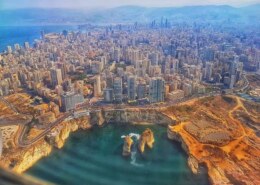If you’re living in Lebanon or planning to move there, here’s some essential information to know:
Location and Geography: Lebanon is a country located in the Middle East, bordered by Syria to the north and east, and Israel to the south. It has a diverse landscape, including the Mediterranean coastline, mountains (such as Mount Lebanon), and the fertile Bekaa Valley.
Official Languages: The official languages of Lebanon are Arabic and French. Arabic is widely spoken by the majority of the population, while French is used in government, education, and business sectors.
Religion and Culture: Lebanon is known for its religious diversity and cultural richness. The major religions include Islam, Christianity (including Maronite, Greek Orthodox, and Catholic denominations), and Druze. This diversity is reflected in Lebanese cuisine, traditions, and festivals.
Climate: Lebanon experiences a Mediterranean climate with hot summers and cool, wet winters. Coastal areas are generally more humid, while mountainous regions have cooler temperatures and receive snowfall during winter.
Cuisine: Lebanese cuisine is renowned worldwide for its delicious and diverse flavors. Some popular dishes include hummus, tabbouleh, falafel, kebabs, shawarma, and baklava. The country is also famous for its wines and arak (an anise-flavored alcoholic drink).
Safety and Security: It’s important to stay informed about the current security situation in Lebanon. While the overall security has improved in recent years, occasional political tensions and regional conflicts can impact the country. Stay updated with travel advisories and follow local news sources for any developments.
Transportation: Lebanon has an extensive road network, and driving is the most common mode of transportation. However, traffic congestion is a common issue in urban areas. Public transportation options include buses, shared taxis (service), and the newly launched Beirut Tram. It’s also worth noting that Lebanon has an international airport, Rafic Hariri International Airport, located in Beirut.
Cost of Living: The cost of living in Lebanon can vary depending on the area and lifestyle. While certain goods and services can be relatively affordable, others, such as housing, can be quite expensive. It’s advisable to research and plan your budget accordingly.
Tourist Attractions: Lebanon offers a rich historical and cultural heritage. Explore attractions like the ancient ruins of Baalbek, Byblos, and Tyre, visit the vibrant cities of Beirut and Tripoli, or enjoy the natural beauty of the Jeita Grotto, Cedars of God, and the Qadisha Valley.
Healthcare and Education: Lebanon has a good healthcare system with a mix of public and private hospitals and clinics. It’s recommended to have comprehensive health insurance coverage. The country also has numerous universities and educational institutions, making it a regional hub for higher education.
Remember to respect local customs and traditions, be mindful of cultural sensitivities, and stay informed about any local regulations or guidelines. It’s always advisable to consult official sources and seek advice from locals or expatriate communities for a more comprehensive understanding of living in Lebanon.

